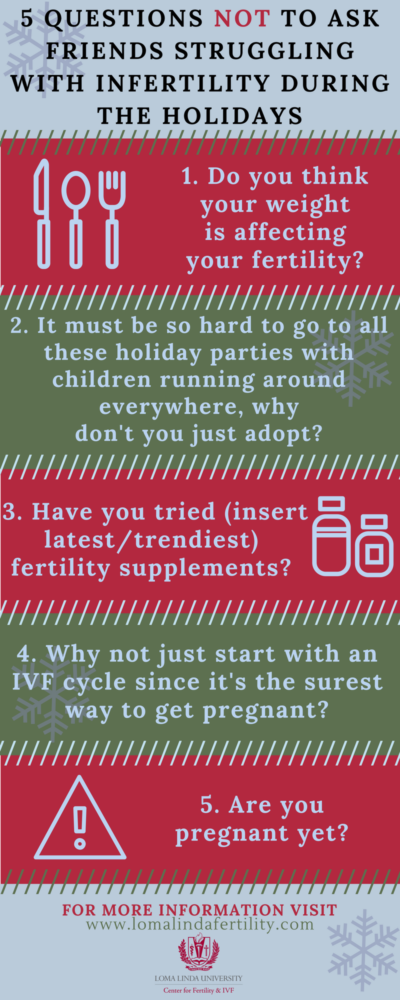You want to show your support to your friend by asking her questions. Not so fast. Sensitivity about one’s infertility skyrockets during the holiday season. You may think that you are being supportive, but if you don’t screen out some questions, you risk coming off ignorant and insensitive.
Start by avoiding these questions
Spread the word by sharing the graphic below on your social media, and keep scrolling for what to talk about instead!
1. Do you think your weight is affecting your fertility?
This is less of an actual question and more like a hurtful jab. Are you a fertility specialist? No? Then probably it is best to avoid an accusing question like this. If your friend is obese and she has been visiting a fertility specialist, then she is likely taking steps to lose weight in order to improve her fertility. Keep in mind that infertility cases are also caused by male sperm factors.
2. It must be so hard to go to all these holiday parties with children running around everywhere, why don’t you just adopt?
Keep holiday party conversation light and positive. Although likely unintentional, statements like this minimize your friend’s struggle. Your friend can still support the concept of adoption, but if she really wanted to consider it for herself, she would be doing so without being asked this question.
3. Have you tried (insert latest/trendiest) fertility supplements?
Supplements that are advertised to increase fertility and chances of conception are not fully backed by research and their success is anecdotal. If there is a magic pill available at the corner drugstore that guaranteed a pregnancy, your friend probably will have popped it by now. Chances are if you’ve read about a new fertility supplement, your friend has too.
4. Why not just start with an IVF cycle since it’s the surest way to get pregnant?
Would you give a 15-year-old the keys to a Ferrari and send her off for a spin on the Autobahn? Most fertility specialists, as with those at Loma Linda University Center for Fertility and IVF, recommend a thorough evaluation before starting a treatment plan. In vitro fertilization (IVF) and the related procedures such as preimplantation genetic screening (PGT-A) and preimplantation genetic diagnosis (PGT-M) can be expensive. If a patient can be spared that higher cost and commitment and still have a child, this is best for both the patient and the doctor.
5. Are you pregnant yet?
If your friend isn’t broaching the topic, neither should you. Once a fertility patient receives a positive pregnancy test, it still may not be time to celebrate. As with any pregnancy, the first 12 weeks following conception is a pensive time. Most do not share the news until after the 12-week mark because of the higher risk of miscarriage. Although many couples are open about their fertility treatments and do not mind sharing when treatment cycles are or are not successful right off the bat, let them initiate this dialogue.
How to show your support to friends experiencing infertility
Keep in mind that there’s no way to know how somebody who is experiencing infertility is actually feeling. It’s about them, not you. To be helpful, supportive and compassionate, communicate that you are available to talk whenever they are ready. Everyone’s case is different.
The holiday season is stressful enough as it is. Take another sip of eggnog and think twice before you blurt out your burning questions about your friend’s fertility experience.

